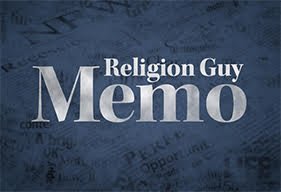According to the Gallup Poll, 49% of American adults called themselves "pro-choice" last year versus 47% "pro-life," with the second designation chosen by 73% of those who attend worship weekly and 74% of Republicans.
The over-all population posted the same virtual tie in each of the prior three years. Journalists, by the way, should note that Gallup's question defied the widely-followed Associated Press Stylebook, which despite some criticism rejects both of those familiar labels in favor of "abortion-rights" versus "anti-abortion" while disallowing "pro-abortion."
After last week's leak to Politico of a Supreme Court draft opinion that would return abortion policy-making to each state, the Pew Research Center (media contact 202-419-4372) released poll results that are vitally important for media analysis.
Here’s where the stories will be found: The Pew team warns against Gallup's two-sided breakdown above, since "relatively few" Americans "take an absolutist view" for or against legality in all circumstances.
Much ambivalence is evident. Fully 33% of Pew respondents believed that whether to abort should "belong solely to the pregnant woman" (and 72% among Americans over-all) AND at the same time believed that "human life begins at conception so a fetus is a person with rights" (held by a 56% majority of Americans).
The Pew data fill a 78-page report, titled "America's Abortion Quandary." As typical with Pew, the new survey stands out for the precision and variety of questions, special skill in defining religious sectors (though this project does not distinguish between Hispanic and non-Hispanic Catholics), the huge sample of 10,441 (compared with 1,016 for that Gallup poll) and consequently a remarkably high response rate of 89% among members of Pew's ongoing American Trends Panel.
Another technical note on polls. Regarding political races they are often more accurate on the national level than with state races. And the Supreme Court draft indicates abortion policy will be returned to each individual state — so that's where legal and political fireworks will occur unless efforts in Congress succeed. That could have big consequences for both political parties, as discussed in last week’s “Crossroads” podcast here at GetReligion.
Religion writers will naturally focus on that factor.
Asked whether religion is "very important" in shaping their views, 73% of white evangelical Protestants said yes compared with 51% of black Protestants and only 28% for non-evangelical or "mainline" Protestants. Abortion was deemed "morally acceptable in all cases" by tiny minorities — 7% for all adults, 2% of white evangelicals, 4% of non-evangelical whites, 7% of Black Protestants, 4% of Catholics and 13% for the non-religious. A 43% plurality of Catholics thought abortion should be legal but with "some exceptions."
Here are some other Pew findings to note.
* Broad-brush, 19% wanted abortion to be legal in "all cases, no exceptions," 42% thought abortion should be legal in "most cases," 29% said illegal in "most cases," and 8% illegal "in all cases, no exceptions." That general breakdown has been pretty consistent since 1995.
* A 56% majority say abortion providers should be required to obtain a parent's or guardian's consent with a pregnant minor.
* Should the country legally allow abortion in situations where it is immoral? Nearly half (48%) said yes.
* Prior to the March polling and leaked Supreme Court draft, only 35% had given much thought to abortion issues.
* On reasons for abortion, 73% favored legality with danger to the mother's "life or health" (it would have been useful to raise those two situations separately), 69% with rape cases, but only a slight 53% majority if the baby is "likely to have severe disabilities or health problems."
* A majority (56%) believed that how far the pregnancy is along should be a factor in deciding on legality. After 14 weeks or roughly the start of the second trimester only 34% affirmed legality (another 22% said "it depends"). At 24 weeks, around the "viability" line in current Supreme Court rulings, 22% favored legality with 18% saying "it depends."
* There were only modest differences on the basis of gender. For instance, 38% of men said human life begins at conception so the fetus is "a person with rights," and so did 39% of women. For women, 68% held the middle-road view that abortion should be legal in some cases and illegal in others, compared with 74% for men.
* Nearly half over-all (47%) believed women who get an abortion illegally should be penalized in some way, and 43% wanted to punish people who help find or schedule an abortion provider.
This is a political story, that also has major religious implications. That’s been true for decades/
When it comes to politics, 30% of Democrats favor legalized abortion with "no exceptions." With Republicans, 65% said it should be legal in some cases and illegal in others with 47% saying "mostly illegal."
In contrast with the loudest party voices on Capitol Hill, among Democrats plus those who "lean" Democrat, 40% said "human life begins at conception, so a fetus is a person with rights." Among Republicans and their "leaners," 55% thought the decision should "belong solely to the pregnant woman."
FIRST IMAGE: Free stock footage of judge’s gavel coming down, located at MakeAGif.com


